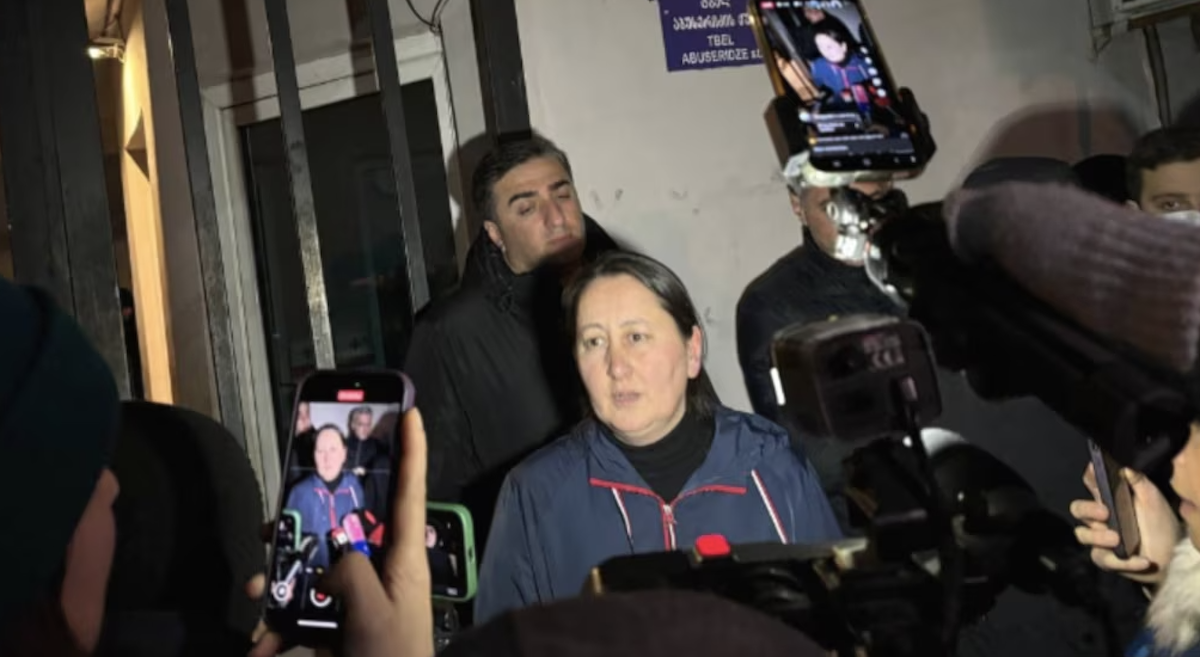International Press Institute calls for release of Georgian journalist Mzia Amaglobeli
Reactions to Amaglobeli’s arrest in Georgia and worldwide
The International Press Institute (IPI), along with 12 media rights organizations, issued a joint appeal to Georgian authorities, demanding the immediate release of Mzia Amaglobeli, founder of Georgian outlets Batumelebi and Netgazeti. They also called for a thorough investigation into allegations of mistreatment following her arrest.
The statement outlines the circumstances of Amaglobeli’s detention, the assessments of NGOs, and details of the legal proceedings. IPI has classified the case as an attack on press freedom.
Case of Mzia Amaglobeli
Mzia Amaglobeli, founder and media manager of independent online outlets Batumelebi and Netgazeti, was arrested twice during a protest outside the Batumi police headquarters on the night of January 11-12. She was initially detained for placing a sticker on the building calling for a general strike but was released on bail a few hours later.
Shortly after, Amaglobeli was re-arrested for slapping police chief Irakli Dgebuadze, following repeated insults directed at her. The incident occurred amidst a clash between protesters and police, with reports of provocation by law enforcement.
Amaglobeli was denied access to her lawyer for three hours after her arrest. She also informed Georgia’s ombudsman about mistreatment during her detention.
The journalist faces criminal charges for allegedly assaulting a police officer, which could result in a prison sentence of 4 to 7 years. She has been placed in pre-trial detention, and the Kutaisi Court of Appeals rejected a motion to change the measure, keeping Amaglobeli in custody.
What Is happening with Mzia Amaglobeli now?
The journalist has been on a hunger strike for several days, which has begun to affect her health. Friends, colleagues, and supporters have written an open letter urging her to end the strike.
“You have been on hunger strike for 11 days. Please stop this extreme form of protest. You are invaluable to us and society as a professional and as a person. It is not worth risking your health and life. Together, we must continue this fight, which profoundly impacts each of us, our profession, and the citizens of our country.
We all stand with you, inspired and encouraged by your example. Please think about your health, your life, and their importance to us.
We need freedom with you!”
The letter was publicly read by journalists on January 22 during another rally in support of Mzia Amaglobeli held near the parliament.
Several political prisoners in Georgia have begun hunger strikes in solidarity with journalist Mzia Amaglobeli. Among them are Rezo Kiknadze and Nikoloz Javakhishvili, arrested during pro-European protests.
Another prisoner of conscience, Zviad Tsetskhladze, expressed his support in a letter from prison:
“If journalists’ voices are silenced, so will ours. Journalists are the bridge between today’s hell and the future we must build for our country. I stand in solidarity with Mzia Amaglobeli as a strong woman and journalist,” wrote Tsetskhladze.
Reactions to Amaglobeli’s arrest in Georgia and worldwide
Mzia Amaglobeli’s arrest has sparked widespread protests and condemnation across Georgia.
On January 21, the Council of Europe’s Platform for the Safety of Journalists expressed alarm over her detention. In 2025, the platform recorded four “red flags” concerning journalist safety in member states, with three involving Georgia and one Ukraine.
“Mzia Amaglobeli and all political prisoners of the Ivanishvili regime must be immediately released! Free and fair elections must be held!” Republican U.S. Congressman Joe Wilson wrote on social media platform X following Amaglobeli’s arrest.
Human rights organizations and lawyers have called her detention unjust and unfounded. The Georgian Young Lawyers’ Association (GYLA), which represents Amaglobeli, has declared her pre-trial detention and prosecution to be examples of political repression. GYLA’s detailed analysis highlights unlawful administrative detention, criminal prosecution, procedural violations, and mistreatment of Amaglobeli by law enforcement.
The Coalition for Media Rights Protection has also issued a strong statement:
“The case of Mzia Amaglobeli transcends the repression of a single journalist—it is an attack on all independent media, civil society, and the democratic future of Georgia. By arresting Amaglobeli, the Georgian Dream regime seeks to intimidate anyone who dares to speak out against injustice.”
On January 23, opposition women politicians petitioned Georgia’s Prosecutor General to change Amaglobeli’s pre-trial detention conditions. “Otherwise, full responsibility [for mishandling the case] will lie with Bidzina Ivanishvili, the Prosecutor General, and all those involved in this process,” they declared outside the parliament building.
The opposition also announced they had drafted a letter about Amaglobeli’s case to be sent to the international community and organizations working on media freedom and journalists’ rights.




















